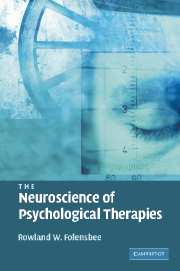Book contents
- Frontmatter
- Contents
- Acknowledgements
- 1 Introduction
- Part 1 Basic concepts
- Part 2 The process of psychotherapy
- 10 Introduction to neuroscience applications in psychotherapy
- 11 Intake and assessment
- 12 Neural networks in therapy
- 13 Affect in therapy
- 14 Memory and change
- 15 Anxiety and change
- 16 The experience of improvement in psychotherapy
- 17 The therapist's neuroscience
- 18 Communicating with clients through neuroscience
- 19 Integrating traditional therapies
- 20 Applying neuroscience to depression intervention
- 21 Neuroscience and psychotherapy: moving forward
- Appendix: Neuroimaging and psychological therapies
- References
- Index
17 - The therapist's neuroscience
Published online by Cambridge University Press: 15 December 2009
- Frontmatter
- Contents
- Acknowledgements
- 1 Introduction
- Part 1 Basic concepts
- Part 2 The process of psychotherapy
- 10 Introduction to neuroscience applications in psychotherapy
- 11 Intake and assessment
- 12 Neural networks in therapy
- 13 Affect in therapy
- 14 Memory and change
- 15 Anxiety and change
- 16 The experience of improvement in psychotherapy
- 17 The therapist's neuroscience
- 18 Communicating with clients through neuroscience
- 19 Integrating traditional therapies
- 20 Applying neuroscience to depression intervention
- 21 Neuroscience and psychotherapy: moving forward
- Appendix: Neuroimaging and psychological therapies
- References
- Index
Summary
Chapters 12 to 16 examined aspects of clients' intrapsychic functioning and overt expression and behavior during psychotherapy in light of brain processes involved. At the same time that neuroscience concepts guide consideration of the client's processing and how to improve this processing, they can also guide understanding and use of the therapist's own brain functioning during therapy. The current chapter does not thoroughly explore the implications of neuroscience conceptualizations for therapist functioning. Rather, this chapter highlights some basic relevant implications that have been observed during the clinical process. General connections between neuroscience concepts and the therapist's functioning are described, the influences of the therapist's neural networks are outlined, limitations to reliance on intuition are identified, and ways to discuss with the client the therapist's neural networks are suggested. This chapter also addresses the implications for the client of the act of discussing the therapist's networks, describes the role of metaphor in the interaction between the client's and the therapist's neural networks, and highlights the importance of the therapist understanding as well as possible underlying patterns within the therapist that may shape the emergence of ideas and hunches into the therapist's conscious awareness.
A therapist's experiences during psychotherapy can be considered in light of all the aspects of neuroscience previously described in regard to client functioning. The therapist's functioning during therapy can be considered in light of the characteristics of input absorbed by the therapist, processing of information taken in, and outputs subsequent to this processing.
- Type
- Chapter
- Information
- The Neuroscience of Psychological Therapies , pp. 137 - 142Publisher: Cambridge University PressPrint publication year: 2007



